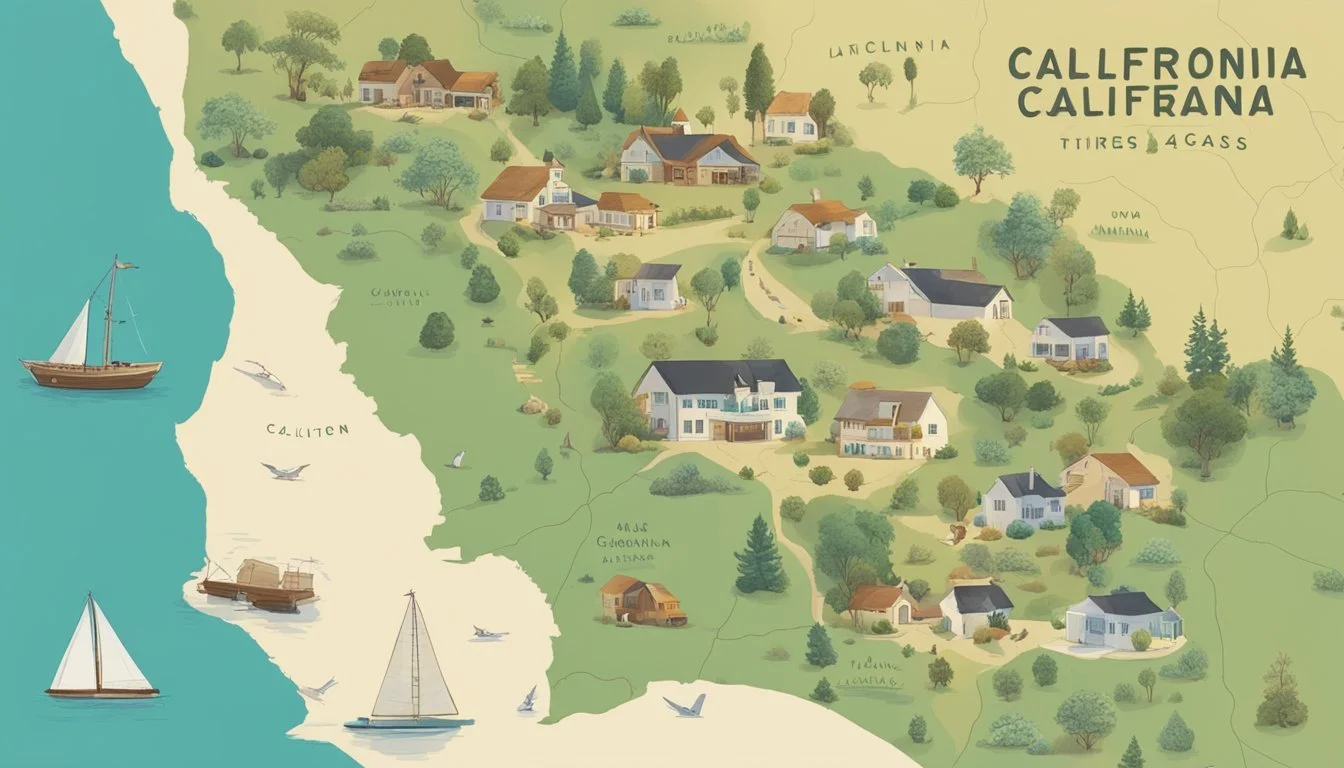Small Farms for Sale in California
Your Guide to Finding the Perfect Property
This Article is Part of State-by-State Guide to Buying Your First Small Farm
Small farms in California are an embodiment of the state's diverse agricultural heritage, offering an appealing combination of rural lifestyle and economic opportunity. The allure of owning a small farm in California comes from its potential to produce a wide array of crops due to the state's varied climates and fertile soils. These properties can range from modest hobby farms to more substantial holdings, equipped with the amenities necessary for a fully operational agricultural venture.
The market for small farms in California shows a steady interest, catering to both experienced farmers seeking to downsize and novices eager to embark on sustainable living. With available properties spanning the state's regions, buyers can find small farms in the wine-producing areas of the Central Coast, the agricultural hubs of the Central Valley, or the scenic landscapes of the Gold Country and the Shasta Cascade region.
California's economic climate, alongside supportive agricultural policies and a strong market for local produce, makes investing in small farms a sound decision. Prospective buyers can explore a variety of listings that offer a range of acreages, infrastructure, and price points to suit diverse needs and budgets. They present an opportunity to continue California's farming legacy while adopting innovative farming practices that can thrive in today's market.
Overview of the Californian Small Farm Market
The small farm market in California is diverse, offering properties that range from under 10 acres to larger, more expansive acreages. The variety of available land provides potential buyers with ample choice in finding a farm that meets their specific needs and lifestyle aspirations.
Current Trends in Small Farms
In Southern California, properties such as a 22-acre farm in San Luis Obispo County and a 35.6-acre Riverside County farm exemplify the trend towards smaller-scale, manageable farms. These properties are perfect for prospective owners looking for land that balances space for agricultural pursuits with the ease of management often associated with smaller farms.
Property Sizes: The acreage of small farms for sale varies considerably, from as low as 8 acres in regions like Del Norte County to more significant parcels of 39 acres in Amador County.
Real Estate Dynamics: The market is witnessing a steady interest in these versatile smaller acreages, where the properties often come with residential amenities—examples include a 1,619 square-foot home on Trinity County's 20.7 acres or a 3,106 square-foot residence in Colton, California.
The Appeal of Small Farm Life
The appeal of small farm life in California is significant for those looking for a retreat from city life or a sustainable lifestyle. Small farms offer the charm of rural living while still offering accessibility to local markets and communities.
Lifestyle Benefits:
Sustainable Living: Small farms provide opportunities for organic farming, self-sufficiency, and a closer connection to nature.
Community: Property owners often enjoy a strong sense of community and a shared appreciation for agricultural pursuits.
Market Demand: There is consistent demand for properties that can provide a rural lifestyle without the responsibilities of managing a vast agricultural enterprise. This demand is reflected in the array of farms for sale, like the 44-acre Mariposa County farm or the 37-acre tract in Greeley Hill, which have been on the market for varying lengths of time.
By combining the allure of rural living with the practicality of smaller acreages, California's small farm market continues to attract a diverse group of buyers, from seasoned farmers to those new to agrarian life.
Navigating Small Farm Listings
When searching for small farms for sale in California, prospective buyers should focus on understanding listing prices, evaluating price per acre, and identifying overall value for money in their investment.
Understanding Listing Prices
Listing prices for small farms in California can vary widely based on location, available infrastructure, and land quality. Mariposa County and San Luis Obispo County, for example, showcase properties listed at $1,500,000 for 44 acres and $2,250,000 for 22 acres respectively. This variance stems from differences in regional market demand and the specific characteristics of each farm.
Evaluating Price per Acre
Price per acre is a critical metric when examining farm listings. To calculate, divide the purchase price by the total acreage. For instance, a 37-acre farm in Mariposa County at a listing price of $368,500 results in approximately $9,959 per acre. Buyers should compare this against average prices in the desired region to determine if a listing is priced fairly.
How to Identify Value for Money
Value for money is determined not just by the listing price or price per acre, but by assessing what the farm offers in terms of resources, such as water rights, soil fertility, and existing agricultural infrastructure. For instance, a higher priced farm may include valuable assets such as fully operational irrigation systems or high-quality crop land, justifying a higher overall purchase price. It's crucial for buyers to conduct thorough research or consult with real estate professionals familiar with agricultural properties to understand all the factors that contribute to a farm's value.
Region-Specific Insights
California's diverse geography presents a variety of farming potentials, from northern regions recognized for vast acres suitable for a mix of agricultural pursuits to southern areas with opportunities for specialized rural enterprises.
Northern California Farming Prospects
Northern California is characterized by a cooler climate and a variety of terrains, from coastal areas to mountainous regions. Siskiyou and Del Norte counties offer properties such as a 15-acre farm in Fort Jones and an 8.73-acre plot in Del Norte County, with suitable conditions for cultivation and livestock. Sonoma County, known for its wine country, presents 30-acre farms near Valley Ford that cater to viticulture and organic farming.
Central California Agriculture
Central California is the heartland of the state's agricultural sector, where counties like Fresno and Kern are national leaders in agricultural production. Farms in these areas typically offer more acreage, like a 44-acre property in Mariposa County, which supports both crop production and grazing. Merced and Tulare counties also contribute significantly to dairy and nut farming, offering vast tracts of fertile land with irrigation infrastructure.
County Notable Agricultural Traits Fresno County Diverse crops, extensive acreage Kern County Leading in high-value crops Mariposa County Suitable for mixed agricultural use
Southern California Rural Opportunities
The southern region, encompassing counties like Imperial, Riverside, and San Diego, offer unique agricultural opportunities given their warmer climates. This region is favorable for farms focusing on fruit and vegetable production, as well as niche markets like organic and boutique farming. In places like Ventura and Los Angeles counties, smaller farms are often integrated with local and farmers' markets, leveraging the proximity to urban centers.
San Luis Obispo County stands out with a 22-acre farm near Paso Robles that is particularly advantageous for those seeking to engage in viticulture or specialty crops, benefitting from the area's warm days and cool nights.
Types of Small Farms for Sale
In California, prospective buyers find a diverse array of small farms tailored to various lifestyles and agricultural objectives. From hobby farms perfect for leisurely country living to mini farms equipped for self-sufficiency, the options cater to different farming aspirations and scales.
Hobby Farms and Country Life
Hobby farms in California offer an idyllic escape for those looking to enjoy country life without the commitment of large-scale farming. They often feature comfortable residences and sufficient land for gardening, small orchards, or keeping livestock like sheep and poultry. Locations such as Amador and San Luis Obispo Counties are known for their serene landscapes and community that fosters this lifestyle.
Rural Mini Farms and Self-Sufficiency
Rural mini farms serve those aiming for a degree of self-sufficiency within a manageable acreage. These farms afford individuals the opportunity to grow their own food, raise animals like goats, and enjoy the peace of rural living. Smaller plots in regions like Riverside County offer the essentials for a self-sustaining lifestyle without the vast expanse of traditional farms.
Specialized Livestock Farms
Specialized livestock farms focus on the cultivation of animals such as goats, sheep, and poultry. They are intentionally designed with facilities like chicken coops, fenced pastures, and sometimes even processing areas to support a farm-to-table operation. Typically ranging from 10 to 50 acres, these farms are located across various counties, providing different climates and environments conducive to livestock farming.
Closing the Deal on a Small Farm
Closing the deal on a small farm in California involves careful financial planning, understanding the legalities of land purchase, and preparing for the transition to farm ownership.
Financial Planning and Loans
Acquiring a small farm requires substantial financial consideration. Prospective buyers should have a comprehensive budget that includes the purchase price, operational costs, and contingencies. They must explore various financing options such as:
Traditional Loans: Loans from banks or credit unions with fixed interest rates.
Government-Backed Loans: USDA loans specifically for rural properties and farmers.
Owner Financing: Sometimes sellers offer direct financing with negotiable terms.
Legal Considerations in Farm Purchasing
Purchasing farm property necessitates a clear understanding of the legal aspects involved:
Title Search: Ensures the farm is free of liens or disputes.
Zoning Laws: Confirms that the land use complies with local agricultural regulations.
Water Rights: Critical in California, buyers should verify legal access to water sources for irrigation.
A real estate attorney can assist with these matters to avoid future legal complications.
Transition to Farm Ownership
The final phase in acquiring a small farm is a smooth transition to ownership:
Inspections: Buyers should carry out thorough property inspections for land quality, infrastructure, and equipment.
Integration Plans: Developing strategies for integrating into the local farming community and market.
Continuity Plans: Consideration of whether and how ongoing farm operations will continue post-purchase.




